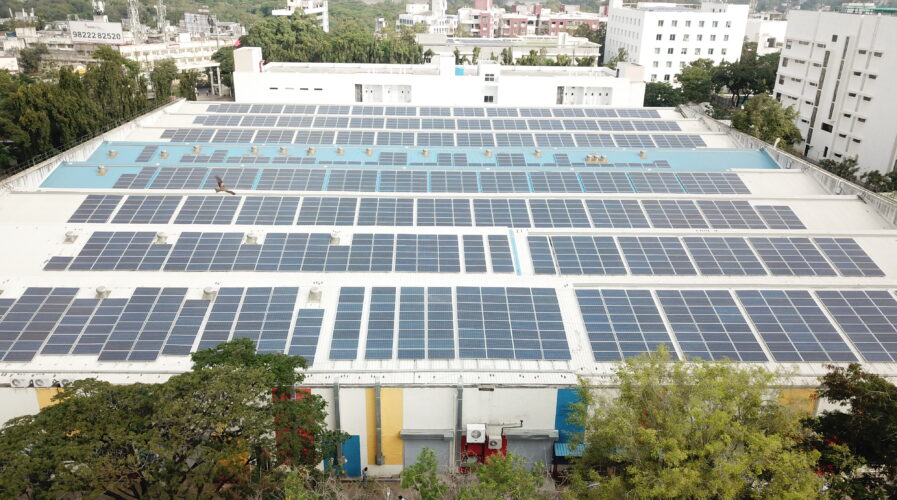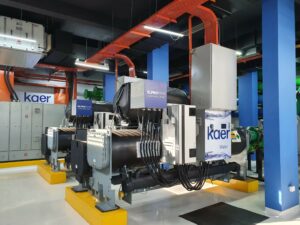
Kaer already delivers its unique CaaS model at 1 Elpro Business Park & Elpro City Square, a mixed-use development in Pune, India. (Source – Kaer)
Modern cooling systems in India can reduce energy consumption
Cooling systems are essential in buildings and infrastructures in areas with high humidity levels. However, one of the biggest problem with traditional cooling systems is the impact it brings to the environment.
Today, cooling is 10% of the world’s energy consumption and cooling needs are going to triple in the next 30 years, much of which will be coming from Asia. The traditional cooling systems used today are inefficient and contribute to rising carbon emissions. To own, operate and maintain a cooling system, building owners also need to make capital investments worth millions in non-core business activity.
In India, the demand for cooling systems is expected to grow five to eight times by 2037-38, as compared to 2017-18 levels. In March 2019, the India Cooling Action Plan (ICAP) was introduced to provide a 20-year perspective and outlines actions needed to provide access to sustainable cooling. The plan seeks to reduce cooling demand across sectors by 20% to 25% by 2037-38. In the last two years, the progress towards this goal has been slow, making it essential for India to take more effective steps to adopt sustainable cooling.
To help India deal with this, Kaer, a global Cooling as a Service (CaaS) provider headquartered in Singapore, is expanding its operations in six major cities in India. The cities are Bengaluru, Gurugram, Noida, Chennai, Hyderabad, and Mumbai. The company is expanding aggressively across the market, tapping into India’s high demand for centralized cooling, which accounts for about 57% of the country’s energy requirements.
As a pioneer of CaaS, Kaer has designed, built, and operated cooling systems for commercial and industrial buildings in Asia for over 70 years. Aiming to make CaaS the model of choice for the real estate industry, Kaer enables businesses to simply buy cooling on a pay-as-use basis to overcome significant capital investment and challenges associated with owning a cooling system.
Kaer currently has projects across Asia, with its CaaS model delivering cooling to mission-critical facilities to support their operations and with a focus on renewable energy and sustainable operations, saving over 25,000 metric tons of carbon dioxide every year.
Transforming cooling systems in India
 Traditionally, building owners purchase, install and run cooling systems, with high upfront costs, along with ongoing maintenance and operational costs. Under the CaaS model, Kaer assumes all financial investments and operational responsibilities while building owners buy cooling at a fixed $/RTH (Refrigerant Ton Hour) rate on a pay-as-you-use basis.
Traditionally, building owners purchase, install and run cooling systems, with high upfront costs, along with ongoing maintenance and operational costs. Under the CaaS model, Kaer assumes all financial investments and operational responsibilities while building owners buy cooling at a fixed $/RTH (Refrigerant Ton Hour) rate on a pay-as-you-use basis.
Justin Taylor, CEO of Kaer said that through CaaS, they believe they can deliver the positive impact of cooling and accelerate the transition to low carbon and climate-resilient future. He added that India, the second-largest contributor to carbon emissions in the region, is a critical market for Kaer.
“We are looking to grow our operations in India and expand our local team that helps businesses transition confidently to the CaaS model, ultimately giving them a competitive advantage,” added Taylor.
For Govindan Raghavan, Managing Director at Kaer India, CaaS offers a huge opportunity for Indian businesses to capitalize on by reducing their carbon footprint, saving CAPEX, and reducing operational and management costs.
Kaer already delivers its unique CaaS model at 1 Elpro Business Park & Elpro City Square, a mixed-use development in Pune, India. It comprises a retail center, automotive parts factory, offices, schools, and community spaces.
Kaer’s CaaS model in India will enable buildings to move to a much better position to qualify for Leadership in Energy and Environmental Design (LEED) certifications by the U.S. Green Building Council (USGBC) or Indian Green Building Council (IGBC) by virtue of significant energy savings. LEED is the most widely used rating system for green buildings globally. It provides a framework for healthy, efficient, and cost-saving green buildings and is a globally-recognized symbol of sustainability achievement and leadership.
READ MORE
- The criticality of endpoint management in cybersecurity and operations
- Ethical AI: The renewed importance of safeguarding data and customer privacy in Generative AI applications
- How Japan balances AI-driven opportunities with cybersecurity needs
- Deploying SASE: Benchmarking your approach
- Insurance everywhere all at once: the digital transformation of the APAC insurance industry


